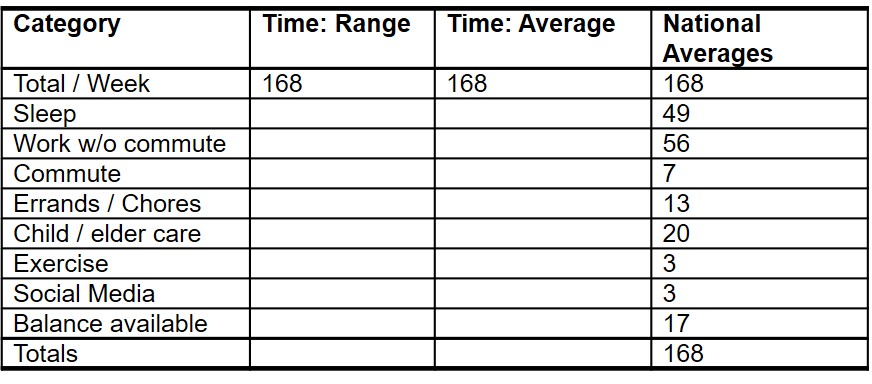Converting to Online Teaching
A series of short guidance articles for educators and institutions
SERIES ARTICLE
By John Cable, Director
Project Management Center for Excellence
A. James Clark School of Engineering
University of Maryland
College Park, Maryland, USA
Early in my career at the University of Maryland, I was asked to run a workshop on project management fundamentals for a campus group. Much to my surprise, when we opened the Q&A session, many of the questions had nothing to do with PM basics but rather on how to manage their time! Not the project schedule, but individual time management!
So, I started to incorporate the topic into my PM fundamentals presentations and over the years the presentation has evolved. This article shares some of these ideas with you.
Time is fixed. There are 24 hours per day, 7 days a week, etc. and each week contains 168 total hours, no more, no less. So, if you sleep 8 hours each night, there are 112 hours left in the week. What do you do with them? It is up to you to use them efficiently and wisely!
If you want to be deliberate about how you spend your time, you must develop a system of time management that works for you. Book stores usually have dozens of books on managing your time and each author assures you that their system really works! And, it probably does for them. But you are not them! Your only hope is to design a system that works for you.
So, let’s agree that your objective is to build the necessary capacity for you to reach and sustain a high level of individual performance in the face of increasing demand!
Let’s begin by doing an exercise that can help put things in focus. The following table allocates time into broad categories that we have national averages for. Complete this for yourself to see where you stand.

Table 1: Weekly Time Allocation in Hours
Are there any surprises? Do your totals add up to more than 168? Are any areas underfunded? Looking at how you spend your personal time this way, are there any changes you want to make? Are you spending your time according to your values and priorities? Your distribution is going to be different than the national averages, that column simply provides you a reference point.
Think about this information for a while and let it sink in. While you are doing that, let’s have a look at how we use our time while working. Stephen Covey in his book “The Seven Habits of Highly Effective People” presents us with a way to think about the time we spend at work. He suggests allocating your work hours into a 2 x 2 matrix.
More…
To read entire article, click here
Editor’s note: This series of articles by the Director of the University of Maryland’s Project Management Center for Excellence provides information and advice for converting from traditional in-person classes to online teaching, based on their experience before and during the Covid-19 pandemic of 2020.
How to cite this article: Cable, J. H. (2021). Converting to Online Teaching: A series of short guidance articles for educators and institutions – Individual Time Management, PM World Journal, Vol. X, Issue III, March. Available online at https://pmworldlibrary.net/wp-content/uploads/2021/03/pmwj103-Mar2021-Cable-individual-time-management-converting-to-teaching-online-11.pdf
About the Author

John Cable
Director, Project Management Center for Excellence
University of Maryland, College Park, MD, USA
![]()
John Cable is Director of the Project Management Center for Excellence in the A.James Clark School of Engineering at the University of Maryland, where he is also a professor and teacher of several graduate courses in project management. His program at the University of Maryland offers masters and PhD level programs focused on project management. With more than 1,300 seats filled annually with students from many countries, including more than 40 PhD students, the program is the largest graduate program in project management at a major university in the United States.
John Cable served in the newly formed U.S. Department of Energy in 1980, where he was involved with developing energy standards for buildings, methods for measuring energy consumption, and managing primary research in energy conservation. As an architect and builder, Mr. Cable founded and led John Cable Associates in 1984, a design build firm. In 1999 he was recruited by the University of Maryland’s Department of Civil & Environmental Engineering to create and manage a graduate program in project management. In his role as founder and director of the Project Management Center for Excellence at Maryland, the program has grown to offer an undergraduate minor, master’s degrees, and a doctoral program. Information about the Project Management Center for Project Management at the University of Maryland can be found at www.pm.umd.edu.
In 2002, PMI formed the Global Accreditation Center for Project Management Educational Programs (GAC). Mr. Cable was appointed to that inaugural board where he served as vice chair. In 2006, he was elected as chairman, a role he held through 2012. As Chair of the PMI GAC, John led the accreditation of 86 project management educational programs at 40 institutions in 15 countries in North America, Europe, the Middle East, Latin America and the Asia Pacific Region. John was awarded PMI’s 2012 Distinguished Contribution Award for his leadership at the GAC. He can be contacted at jcable@umd.edu.
To view other works by John Cable, visit his author showcase in the PM World Library at https://pmworldlibrary.net/authors/john-cable/









